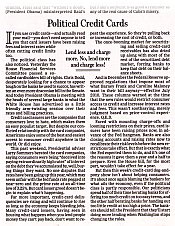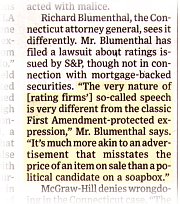Thursday, 30 April 2009
I’ve squeezed Glenn’s deficit graphic so it fits in the sidebar. Image size is 220 x 300px. You’re welcome to copy, but hotlinking won’t work.
Anybody done a T-shirt yet?
more...
Posted by: Old Grouch in
In Passing
at
15:59:44 GMT
| Comments (1)
| Add Comment
Post contains 34 words, total size 1 kb.
Tuesday, 28 April 2009
Via Instapundit, who notes
Of course, this gives Obama a filibuster-proof majority.Yeah, but it also means that every vote Specter casts is another nail in the coffin of Democrat ownership of what he votes for. I’d rather have him voting as a Democrat than giving the Democrats “bipartisan†cover by voting as a RINO.
One down...
Previously.
Posted by: Old Grouch in
In Passing
at
17:22:58 GMT
| Comments (1)
| Add Comment
Post contains 69 words, total size 1 kb.
Three more illustrations of the old axiom, “Governments default to secrecy:â€
The photo-op that frightened a city.
On Monday morning, one of the 747s used to ferry arount the president of the U.S. was dispatched to the Statue of Liberty, escotred by fighter jets. Assignment: Get some fresh glamour shots of the plane.And just why did this need to be classified? The President wasn’t aboard.[2] Widespread notice would have prevented panic. But no...
The Air force said the flight needed to remain confidential. So while New York police knew about it, as did at least one person in the mayor’s office,[1] regular New Yorkers remained in the dark.
As a result, to onlookers Monday all across downtown Manhattan -- where the World Trade Center once stood -- the photo shoot looked like a terrorist attack. - The Wall Street Journal, “A ‘Classified’ Photo Op Turns Into A Soaring Blunder for the White Houseâ€
Is your bank in trouble? Mum’s the word!
The coming “stress tests†are supposed to... finally divulg[e] how the government itself views the banks’ health. In fact, regulators are constantly making these judgments, using a method called Camels...“Corporate officers or top government officials,†huh? We’ve seen how well that worked with Bank of America’s Merrill-Lynch acquisition. (I bet all those BofA shareholders - whose company is now being warned that it “needs to boost capital†- feel good about being lied to “in the national interest.â€)
These Camels scores are treated as top secret. It is a criminal violation to even disclose them to the public...
The problem is that the banking system has lost much public trust already...
One way to restore condifence would be to embrase disclosure full bore... The other approach is to rewrite the securities laws, giving coporate officers or top government officials latitude to hold back disclosures in situations where the national interest outweighs that of the shareholders. - Dennis Berman
When it comes to epidemics, “tweeting’s†not golden.
...Despite all the recent Twitter-enthusiasm about this platform’s unique power to alert millions of people in decentralized and previously unavailable ways, there are quite a few reasons to be concerned about Twitter’s role in facilitating an unnecessary global panic about swine flu.Yep, sure don’t want the masses going around the official channels. Why, who knows what they might discover?
...The “swine flu†meme has [spread? (word omitted) - o.g.] so far that misinformed and panicking people armed with a platform to broadcast their fears are likely to produce only more fear, misinformation and panic.
Thus, unlike basic internet search -- which has been already been nicely used by Google to track emerging flu epidemics -- Twitter seems to have introduced too much noise into the process: as opposed to search requests which are generally motivated only by a desire to learn more about a given subject, too many Twitter conversations about swine flu seem to be motivated by desires to fit in, do what one’s friends do (i.e. tweet about it) or simply gain more popularity.
In situations like this, there is some[thing (?) - o.g.] pathological about people wanting to post yet another status update containing the coveted most-searched words – only for the sake of gaining more people to follow them. ... The bottom line is that tracking the frequency of Twitter mentions of swine flu as a means of predicting anything thus becomes useless...
...In the context of a global pandemic -- where media networks are doing their best to spice up an already serious threat -- having millions of people wrap up all their fears into 140 characters and blurt them out in the public might have some dangerous consequences, networked panic being one of them... - Evgeny Morozov, “Swine flu: Twitter’s power to misinformâ€
HT: Twitter story via Slashdot.
-----
[2] UPDATE 090429 14:25: Little Miss Attila doesn’t agree:
The only potential justification for the media blackout (and FBI/law enforcement blackout) was that one of the passengers was a very high-value individual indeed. Like, the highest.Arlen Specter?
Posted by: Old Grouch in
In Passing
at
17:03:47 GMT
| No Comments
| Add Comment
Post contains 680 words, total size 8 kb.
Friday, 24 April 2009
Thursday’s Wall Street Journal included an editorial (“Political Credit Cardsâ€) that, in anticipation of the forthcoming “little friendly arm-twisting session over their rates and billing practices†with the President, lamented the political reaction to the credit card companies’ recent (and widespread) increases in interest rates and reductions of customers’ credit lines. The editors reviewed the industry’s problems: Rising charge-offs and delinquencies, the collapse of the securitization market, and new federal rules that make doing business more expensive and difficult.[1] Along the way they went after administraton demagoguery (from Larry Summers), and Congressional political opportunism (from the
 likes of Chris Dodd and Barney Frank) as being unhelpful and dishonest.
likes of Chris Dodd and Barney Frank) as being unhelpful and dishonest.It “...isn’t about helping consumers,†the editors say. “It’s about once again blaming the bankers for what ails the economy, even if the political class is partly responsible.†Doesn’t the public realize that the politicaians’ meddling may wreck “the best and easiest access to consumer credit anywhere in the world�
Now this is a difficult position to sell, even under the best of circumstances. As the editors admit, “Credit card issuers are the companies that consumers love to hate, which makes them an easy populist target.†But while nobody loves his creditor, might I suggest that the last few weeks’ political bloviating would have had considerably less resonance among the public at large if the card companies had been making the slightest effort to be a bit more customer-friendly.
A quick trip through the archives at The Consumerist yields story after story of stealth due-date changes, proliferating fees and penalty charges, unannounced credit-limit reductions (sometimes to less than a card’s current balance, which then generates overdraft fees), unexplained rate hikes for good customers... the list seems endless. And something else. All of these practices carry the aroma of cheating. Or if not exactly cheating, playing fast and loose with the “rules of the relationship†in ways designed to trap the customer into forking over extra cash.
The card issuers will say that what they’re doing is all legal, and all covered in the cardholder’s Terms and Conditions (i.e., somewhere in those ten pages printed in type only slightly larger than in the image above). Well maybe. But although you can do something, there are usually various ways to do it. And even the legal profession (weasels all!) recognizes the difference between “good faith†and “bad faith.†Look at the “bad faith†words in that list: “stealth†“unannounced†“unexplained.†Characteristics of an honest business that values its customers?
Managers used to understand how vital it is to make plain that their company is a businesses, not a scam. But from the confusopolies of the cable and cellular telephone providers to the “you didn’t read our contract, so you’re screwed†attitude of everyone from consumer-goods manufacturers to retailers, more and more businesses seem to be making their operating principle “Get their Money- By Hook or By Crook!†Well, if you make screwing your customers your primary goal, don’t be surprised that they wind up hating you.
And when those political demagogues set out to ruin your business, don’t be astonished if your faithful customers set aside their self-interest and instead go for the schadenfreude.
Related:
Rose Parade: Is customer service truly a lost cause...?
-----
Posted by: Old Grouch in
In Passing
at
00:20:23 GMT
| Comments (1)
| Add Comment
Post contains 574 words, total size 6 kb.
Thursday, 23 April 2009
The Register:
The judge in The Pirate Bay trial has been accused of bias, after Sweden’s national radio station revealed that Thomas Norström was a member of the same pro-copyright groups as several of the main entertainment industry reps in the case.Oh really???
Sveriges Radio’s P3 news programme [link in original - o.g.] claimed Norström is signed up to the Swedish Copyright Association (Svenska föreningen för upphovsrätt), which also counts Henrik Pontén, Peter Danowsky and Monique Wadsted as members. All three represented the entertainment industry in the case against BitTorrent tracker site The Pirate Bay.
Additionally, the judge sits on the board of the Swedish Association for the Protection of Industrial Property (Svenska föreningen för industriellt rättsskydd), which is lobbying for tougher copyright laws.
However, Norström insisted to the radio station that his membership of the various copyright protection groups did not “constitute a conflict of interestâ€.
Unsurprisingly, one of the defendants’ lawyers in the case has disagreed...
Elsewhere:
The BBC: Pirate Bay lawyers demand retrial
HT: For title, and the “elsewhere†links, to genes at DP
Posted by: Old Grouch in
In Passing
at
18:25:59 GMT
| Comments (1)
| Add Comment
Post contains 187 words, total size 3 kb.
Wednesday, 22 April 2009
The Indianapolis Star boosts economic stagnation, more state government spending, expensive and unreliable energy:

INDIANA'S TOP THREE ENVIRONMENTAL ISSUES[1]
- DWINDLING OPEN SPACE, HABITATS
Indiana's 4 percent of publicly owned land is among the lowest in the country. He includes opposition to the I-69 expansion in this category, not because he’s against roads but because of what he says is the potential to destroy 2,000 acres of forest.- TOXIC EMISSIONS
Indiana is third in the nation in toxic emissions, including coal ash and mercury, according to EPA data for 2007.[2]- CARBON FOOTPRINT
Kharbanda rejects the idea of “clean coal†technology, calling it cleaner coal, and says the costs are “dramatically understated.†He thinks priority should go to alternative energy sources, such as wind and solar.[3]
(Some previous Gannett-age here, here, here, and here. Not to mention here.)
-----
[2] Not surprising for a state that gets most of its electricity (a lot of which gets sent eastward) from coal, and had its last nuclear plant halted mid-construction by environmentalists.
[3] Which works really well on those long, dark, midwinter nights.
(Star front page image via newseum.org.)
Posted by: Old Grouch in
In Passing
at
16:18:25 GMT
| Comments (1)
| Add Comment
Post contains 213 words, total size 4 kb.
 Headlined Computer Spies Breach Fighter-Jet Project, this one is largely about security leaks from both Defense Department and contractor-operated networks involving the Joint Strike Fighter project, although there is one mention of penetration of the Air Force’s air traffic control system, and an expert’s warning about the possibility of a similar breach of the civilian ATC system operated by the Federal Aviation Agency.
Headlined Computer Spies Breach Fighter-Jet Project, this one is largely about security leaks from both Defense Department and contractor-operated networks involving the Joint Strike Fighter project, although there is one mention of penetration of the Air Force’s air traffic control system, and an expert’s warning about the possibility of a similar breach of the civilian ATC system operated by the Federal Aviation Agency.Compared to the Journal’s previous “cyberespionage†story, this one has more meat to it. Also, this one does not mention the S.773/S.778 “cybergrab†bills, although it does repeat the earlier article’s claim that “...the U.S. electrical-distribution system, as well as other infrastructure, have been [remotely] infiltrated by spies...†It also reports that “the Obama adminstration is likely to soon propose creating a senior White House computer-security post to coordinate policy,†i.e., as would be authorized by S.778.
All-in-all, it does reveal some more grounds for monitoring network security (NTTAWWT), at least as far as government-operated installations are concerned. How applicable this is to private networks, and whether the administration plans to use government-network breaches as a pretext for mandating standards for private networks, as they say, remains to be seen.
LATER: In an article New Military Command to Focus on Cybersecurity published on the web Tuesday afternoon (and probably slated for appearance in Wednesday’s edition), The Journal says that “multiple [unnamed] military sources†have told it that
The Obama administration plans to create a new military command to coordinate the defense of Pentagon computer networks and improve U.S. offensive capabilities in cyberwarfare...The afternoon article[1] also notes
A White House team reviewing cybersecurity policy has sent a raft of recommendations to the president for approval, including the creation of a top White House cyberpolicy official. Mr. Obama is expected to announce the contours of his new approach later this month...This is considerably different from the sweeping provisions in S.773, and equally different from Senator Rockefeller’s statement, which, when enumerating potential candidates for federal regulation says
A draft of the White House review steps gingerly around the question of how to improve computer security in the private sector, especially key infrastructure such as telecommunications and the electricity grid. The document stresses the importance of working with the private sector and civil-liberties groups to craft a solution, but doesn’t call for a specific government role.
...our water to our electricity, to banking, traffic lights and electronic health records—the list goes on...Perhaps the administration is trying to choreograph things so it appears the Old Meanie Congress is “forcing†it to assume the wide-ranging powers that S.773 would grant it.[2]
The report’s “ginger steps around the private sector†smells like a sign of developing oppositon; Maybe somebody besides me read the bill and is upset by it.
Previously:
-----
[2] Certainly a similar “just let it happenâ€scenario has been mooted regarding the Environmental Protection Agency’s on-rushing carbon regulations: “Hey, we didn’t do it... it’s them! (‘Revise the Clean Air Act?’ Shhhh! Verstummen!)â€
Posted by: Old Grouch in
In Passing
at
01:47:22 GMT
| No Comments
| Add Comment
Post contains 575 words, total size 9 kb.
Tuesday, 21 April 2009
Connecticut Attorney General Richard Blumenthal, on credit rating firms’ First Amendment defense against
 potential securities litigation:
potential securities litigation:The very nature of [their] so-called speech is very different from the classic First Amendment-protected expression. It’s much more akin to an advertisement that mistates the price of an item on sale than a political candidate on a soapbox.
...because God knows how horrible it might be should disappointed voters be allowed to sue politicians who fail to live up to their promises!
Posted by: Old Grouch in
In Passing
at
13:52:26 GMT
| No Comments
| Add Comment
Post contains 87 words, total size 1 kb.
Monday, 20 April 2009
51% View Tea Parties Favorably, Political Class Strongly DisagreesTar. Feathers.
While half the nation has a favorable opinion of last Wednesday’s events, the nation’s Political Class has a much dimmer view—just 13% of the political elite offered even a somewhat favorable assessment while 81% said the opposite. Among the Political Class, not a single survey respondent said they had a Very Favorable opinion of the events while 60% shared a Very Unfavorable assessment.
LATER (090422 22:00): Gary Varvel explains it visually at Crucis’.
Via: IP
Posted by: Old Grouch in
In Passing
at
17:52:14 GMT
| No Comments
| Add Comment
Post contains 87 words, total size 1 kb.
From Blair:
In the first three months of the year, 1,395 Pakistanis were killed in 1,842 terrorist attacks. At that rate Pakistan’s terror death toll will overtake the toll from Hurricane Katrina by the end of April. By the end of 2009, we could be looking at double the toll from the World Trade Center attacks.
It’s probably something to do with Presbyterians.
Posted by: Old Grouch in
In Passing
at
17:04:22 GMT
| No Comments
| Add Comment
Post contains 65 words, total size 1 kb.
56 queries taking 0.3405 seconds, 222 records returned.
Powered by Minx 1.1.6c-pink.














